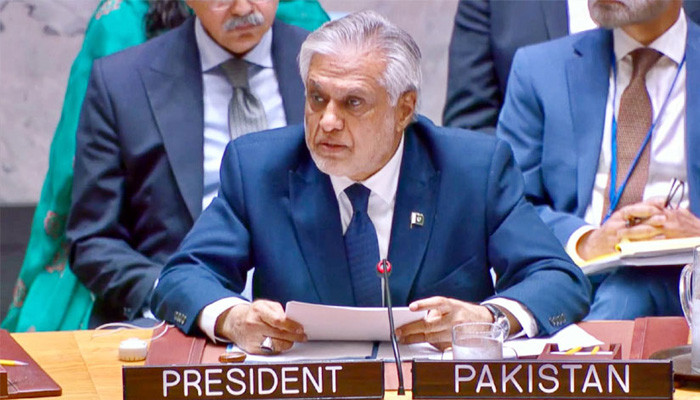UN Security Council Adopts Pakistan-Sponsored Resolution on Peaceful Dispute Resolution
The United Nations Security Council (UNSC) unanimously passed a resolution on Tuesday, put forth by Pakistan, which urges member states to implement measures for the effective execution of the council’s resolutions concerning the peaceful resolution of conflicts, citing examples like Kashmir and Palestine.
The resolution was acted upon during a UNSC session focusing on maintaining international peace and security. The session addressed worrying trends of prolonged and unresolved disputes that pose a threat to global peace and security, emphasizing the need for increased collective efforts to resolve them. This was one of two key events proposed by Pakistan during its presidency at the UNSC.
Senator Ishaq Dar, the Deputy Prime Minister and Foreign Minister, traveled to New York to preside over the high-level meeting. He presented the resolution for a vote, which was then adopted.
The resolution’s approval showcases Pakistan’s prominent role in spearheading the adoption of a resolution by the Security Council, demonstrating impactful diplomatic efforts.
The session held on Tuesday was centered on discussing the promotion of international peace and security through multilateralism and the peaceful settlement of disputes.
UN Secretary-General Antonio Guterres, in his opening remarks, lauded DPM Dar for organizing the discussion and for utilizing the UNSC’s presidency to propose a resolution that urges all member states to fully utilize the available tools in the collective pursuit of global peace, stating its critical importance at this time.
Need for Peaceful Resolution
“The creators of the United Nations Charter understood that the peaceful resolution of disputes is essential when geopolitical tensions rise, when unresolved disputes fuel conflict, and when states lose faith in one another,” the UN chief stated.
The resolution mandates that the Security Council urges all member states to effectively utilize the mechanisms for the peaceful resolution of disputes as outlined in Article 33 of the United Nations Charter.
- These mechanisms include negotiation, enquiry, mediation, conciliation.
- Also include arbitration, judicial settlement, resort to regional agencies or arrangements, or other peaceful means of their own choosing.
The UNSC reaffirmed its role, as outlined in Chapter VI of the UN Charter, to recommend appropriate procedures or methods of adjustment for the peaceful resolution of disputes. This includes considering that legal disputes should generally be referred by the parties to the International Court of Justice.
The Council has encouraged the Secretary-General to ensure the United Nations is capable of leading and supporting mediation and preventive diplomacy, and to continue using his good offices. Member states are urged to support and cooperate with the UN chief in this regard.
The resolution requires the UN Secretary-General to submit concrete recommendations within one year of the resolution’s adoption, aimed at further strengthening the mechanisms for the peaceful resolution of disputes.
The Council also calls upon regional and sub-regional organizations to enhance their efforts toward the peaceful settlement of disputes, in accordance with the United Nations Charter and relevant Security Council resolutions.
The UN Secretary-General remarked that there is a blatant disregard for international law globally, including international human rights law, international refugee law, international humanitarian law, and the UN Charter itself, often without accountability.
Guterres noted that these failures to uphold international obligations are occurring amidst widening geopolitical divides and conflicts, resulting in significant costs in terms of human lives, devastated communities, and lost futures.
He highlighted the dire situation in Gaza, describing it as a horror with unprecedented levels of death and destruction in recent times.
He concluded that while diplomacy may not always prevent conflicts, violence, and instability, it remains a powerful tool to stop them.



Comments (0)
No comments yet. Be the first to comment!
Leave a Comment